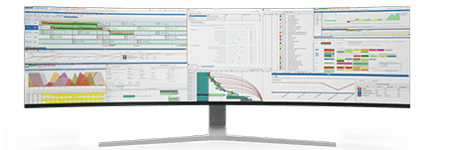
Mastering Multi-Plant Capacity Planning: Essential Strategies for Pharmaceutical Purchasing Managers
Efficient capacity planning across multi-plant operations is essential in pharmaceutical manufacturing. As a Purchasing Manager, your role is intricately tied to ensuring that materials and resources align with production capabilities, regulatory compliance, and market demand.
Integrating advanced tools like PlanetTogether with enterprise systems such as SAP, Oracle, Microsoft Dynamics, Kinaxis, or Aveva can transform capacity planning into a streamlined, responsive, and highly efficient process.

The Challenge of Capacity Planning in Pharmaceutical Manufacturing
Pharmaceutical manufacturing is characterized by stringent regulatory requirements, unpredictable demand fluctuations, and complex supply chains. Multi-plant operations add another layer of complexity, requiring precise coordination between facilities to optimize production, minimize waste, and meet market demands. The key challenges include:
Regulatory Compliance: Ensuring compliance with FDA, EMA, and other regulatory bodies across multiple facilities.
Material Availability: Aligning raw material procurement with production schedules while minimizing holding costs.
Demand Variability: Responding to shifting demand patterns, particularly for seasonal or emergency medications.
Resource Utilization: Balancing production loads across facilities to avoid underutilization or bottlenecks.
Data Silos: Bridging gaps between systems used across different plants to create a unified planning framework.

The Role of Purchasing Managers in Multi-Plant Capacity Planning
As a Purchasing Manager, you’re at the nexus of procurement and production. Your decisions on material procurement and supplier relationships directly impact capacity planning outcomes. For example, delayed material deliveries can stall production, while over-purchasing can lead to costly inventory holding.
Key responsibilities include:
Vendor Management: Negotiating contracts that ensure timely delivery of high-quality materials.
Inventory Optimization: Maintaining optimal stock levels to support production without tying up capital.
Collaboration: Working closely with production planners and supply chain managers to synchronize procurement with capacity plans.
Technology Integration: Leveraging advanced software solutions to gain real-time insights into material requirements and production schedules.


Leveraging PlanetTogether for Multi-Plant Capacity Planning
PlanetTogether is an advanced production planning and scheduling (APS) system that seamlessly integrates with enterprise systems like SAP, Oracle, Microsoft Dynamics, Kinaxis, and Aveva. For multi-plant operations, its capabilities include:
Centralized Planning: Provides a unified view of production capacities across all facilities, enabling better coordination and load balancing.
Scenario Analysis: Allows planners to simulate different scenarios and assess the impact on capacity, materials, and timelines.
Real-Time Visibility: Offers real-time insights into production schedules, material requirements, and potential bottlenecks.
Optimization Algorithms: Utilizes AI-driven algorithms to optimize production schedules and resource allocation.
For Purchasing Managers, integrating PlanetTogether with systems like SAP or Oracle ensures that material procurement is synchronized with updated production schedules, reducing delays and overstocking.

Integration with Enterprise Systems
When integrated with enterprise systems, PlanetTogether enhances data flow and decision-making. Here’s how it works with popular systems:
SAP: Synchronizes material requirements with SAP’s Material Requirements Planning (MRP) module, ensuring procurement aligns with production schedules.
Oracle: Facilitates data exchange with Oracle ERP’s supply chain and inventory management modules for seamless coordination.
Microsoft Dynamics: Integrates with Dynamics’ production planning tools to improve visibility and collaboration across facilities.
Kinaxis: Complements Kinaxis’ supply chain management capabilities with detailed capacity planning insights.
Aveva: Enhances Aveva’s industrial software suite by adding advanced scheduling and capacity optimization features.

Best Practices for Capacity Planning in Multi-Plant Operations
To optimize capacity planning, consider these best practices:
Adopt a Unified Planning Framework Use integrated systems like PlanetTogether and your ERP to create a single source of truth for capacity and material planning. This reduces errors and enhances collaboration between departments.
Prioritize Data Accuracy Ensure that data on production capacities, material availability, and demand forecasts is accurate and up-to-date. This is critical for effective decision-making.
Embrace Scenario Planning Leverage PlanetTogether’s scenario analysis tools to anticipate potential disruptions, such as supply chain delays or equipment failures. Develop contingency plans based on these scenarios.
Focus on Collaboration Foster collaboration between purchasing, production, and supply chain teams. Regular meetings and shared KPIs can align efforts and improve outcomes.
Invest in Training Ensure that your team is well-trained in using advanced planning tools and understanding capacity planning principles.
Capacity planning for multi-plant operations is a complex but critical aspect of pharmaceutical manufacturing. As a Purchasing Manager, you play a pivotal role in ensuring that material procurement supports efficient and compliant production. By integrating PlanetTogether with enterprise systems like SAP, Oracle, or Microsoft Dynamics, you can unlock new levels of efficiency, collaboration, and responsiveness.
Investing in the right tools and practices today will not only address current challenges but also prepare your organization for a future defined by innovation and agility. Are you ready to take your manufacturing operations to the next level? Contact us today to learn more about how PlanetTogether can help you achieve your goals and drive success in your industry.


























LEAVE A COMMENT